Enhancing Business Efficiency: A Comprehensive Guide to Leveraging AI for Process Improvement
Enhancing Business Efficiency: A Comprehensive Guide to Leveraging AI for Process Improvement
In a world where agility and efficiency dictate success, businesses are continuously on the lookout for innovative solutions to enhance their operations. Artificial Intelligence (AI) stands as a transformative force that shapes how organizations approach their processes—promising not only greater efficiency but also unprecedented insights. This guide will outline the various facets of business processes where AI can be effectively leveraged, from discovery to improvement.
AI in Process Discovery: Unveiling Hidden Efficiencies
The journey toward improved business efficiency typically begins with understanding existing processes. Enter AI-driven process discovery—a methodology that replaces traditional, time-consuming practices with a data-centric approach. By harnessing techniques like process mining and natural language processing, AI can swiftly analyze significant operational data to unearth patterns, workflows, and inefficiencies that may otherwise go unnoticed. This elevated visibility allows organizations to pinpoint key areas for development, setting the stage for transformative change.
AI in Process Mapping: Creating a Blueprint for Success
Once we’ve identified inefficient points within a process, it’s time to create actionable blueprints. AI excels in process mapping, translating the insights gained from the discovery phase into comprehensive visual representations of workflows. Utilizing machine learning and data analytics, AI can clearly outline how processes interlink and highlight bottlenecks. A well-structured mapping not only allows for the maintenance of current documentation but also ensures that processes evolve with the organization’s needs, adapting to changing environments with ease.
AI in Process Automation: The Workhorse of Efficiency
The crown jewel in the realm of business process management (BPM) is undoubtedly process automation. Robotic Process Automation (RPA), empowered by AI, tackles repetitive, rule-based tasks that can drain resources and time. From automating data entry to resolving customer support inquiries, AI-driven solutions operate around the clock, eliminating error-prone manual intervention. This liberation from monotonous tasks enables human employees to redirect their energy toward more strategic initiatives that drive value, ultimately nurturing a more dynamic and innovative organizational culture.
AI in Process Management: Navigating the Operation Labyrinth
Detailed process maps pave the way for enhanced execution, but AI further amplifies this by introducing sophisticated management capabilities. With AI-powered monitoring tools, organizations can observe key performance indicators (KPIs) in real-time. This vigilant oversight allows immediate intervention should deviations from expected performance arise. Additionally, by analyzing historical data, AI can forecast potential disruptions and inefficiencies, thus empowering organizations to act preemptively. This shift from reactionary to proactive management represents a paradigm shift in how businesses safeguard their operational health.
AI for Continuous Process Improvement: The Path Forward
The journey doesn’t end once processes are mapped and automated; continuous improvement is the essence of sustained success. AI shines in this area by offering ongoing feedback, data-driven recommendations, and essential performance insights. Organizations can adopt an iterative approach to optimizing processes based on these feedback loops, ensuring their BPM strategies adapt and thrive alongside evolving business objectives. Embracing continuous improvement with AI ensures that organizations remain competitive and aligned with industry standards.
Benefits of AI for Improving Efficiency
To illustrate the immense advantages of integrating AI into business processes, consider the following:
- Faster Results and Better Decision-Making: AI expedites results and enhances decision-making by providing insights from vast data sets quicker than any human could.
- Real-Time Monitoring: The ability to monitor processes in real-time offers organizations the agility to react instantly, rather than waiting for scheduled reports.
- Predictive Analytics: With predictive capabilities, AI equips businesses to strategize for potential challenges before they arise.
- Automating Routine Tasks: Routine automation allows employees to reclaim their time for higher-level projects that foster growth and innovation.
- Enhancing Customer Service: AI can revolutionize customer support, employing intelligent systems to analyze feedback and provide tailored assistance.
The Importance of Training Employees for AI
For AI’s transformative potential to be realized, companies must prioritize training their employees. Adequately equipped teams can seamlessly integrate AI into their workflows, maximizing the technology’s benefits. Training empowers employees to identify applications for AI, effectively utilize the tools at their disposal, and adapt to shifting paradigms. Investing in comprehensive AI training fosters a culture of continuous learning and innovation, positioning organizations at the forefront of their industries.
Conclusion
AI is no longer a futuristic concept but rather a pivotal tool for business efficiency. By enhancing processes through discovery, mapping, automation, and continuous improvement, organizations can optimize their operations and drive meaningful results. Those who embrace AI as an integral part of their strategy not only stand to gain immediate operational advantages but are also setting the stage for sustainable success in an ever-evolving business landscape. The time to harness the power of AI is now—your organization’s journey toward excellence begins here.



